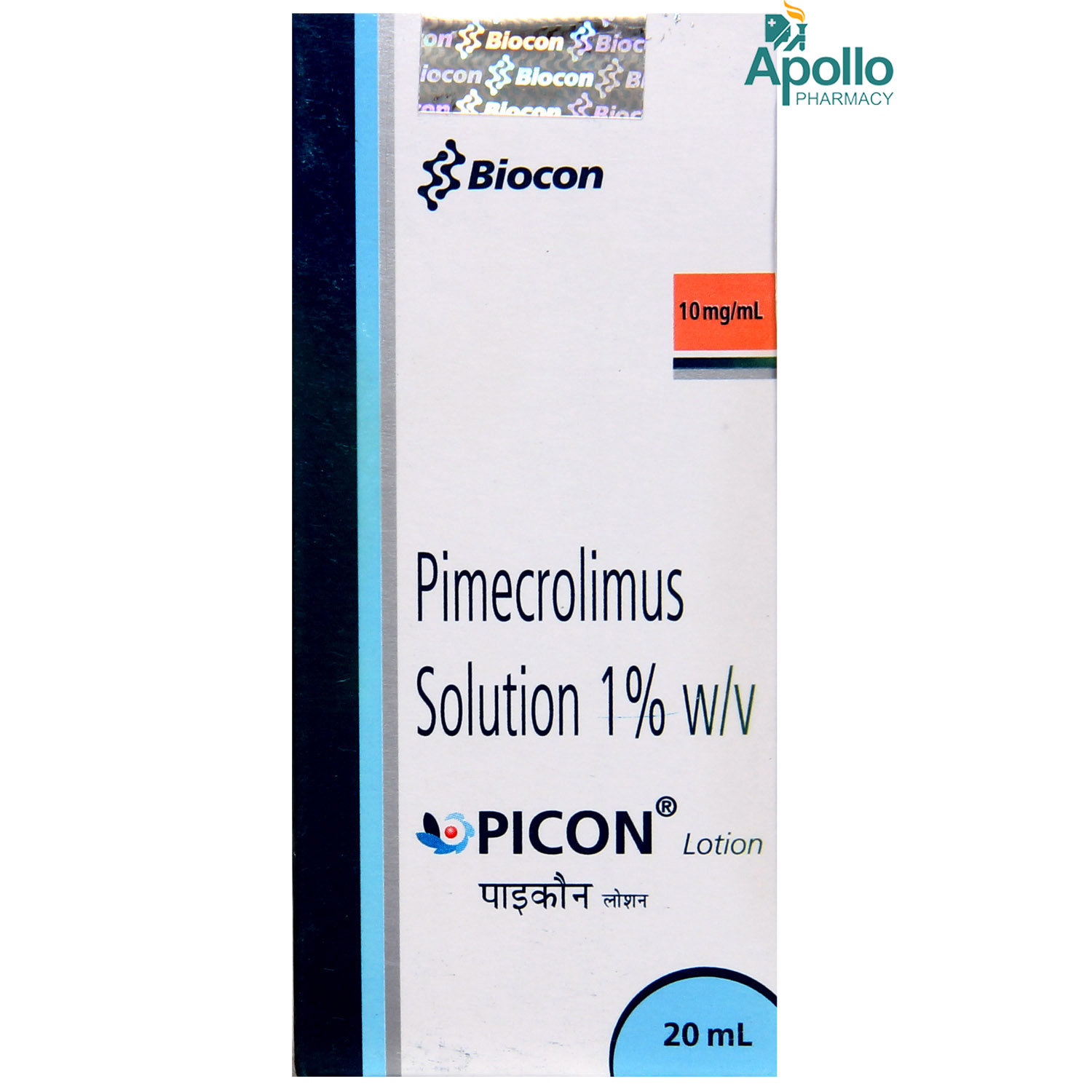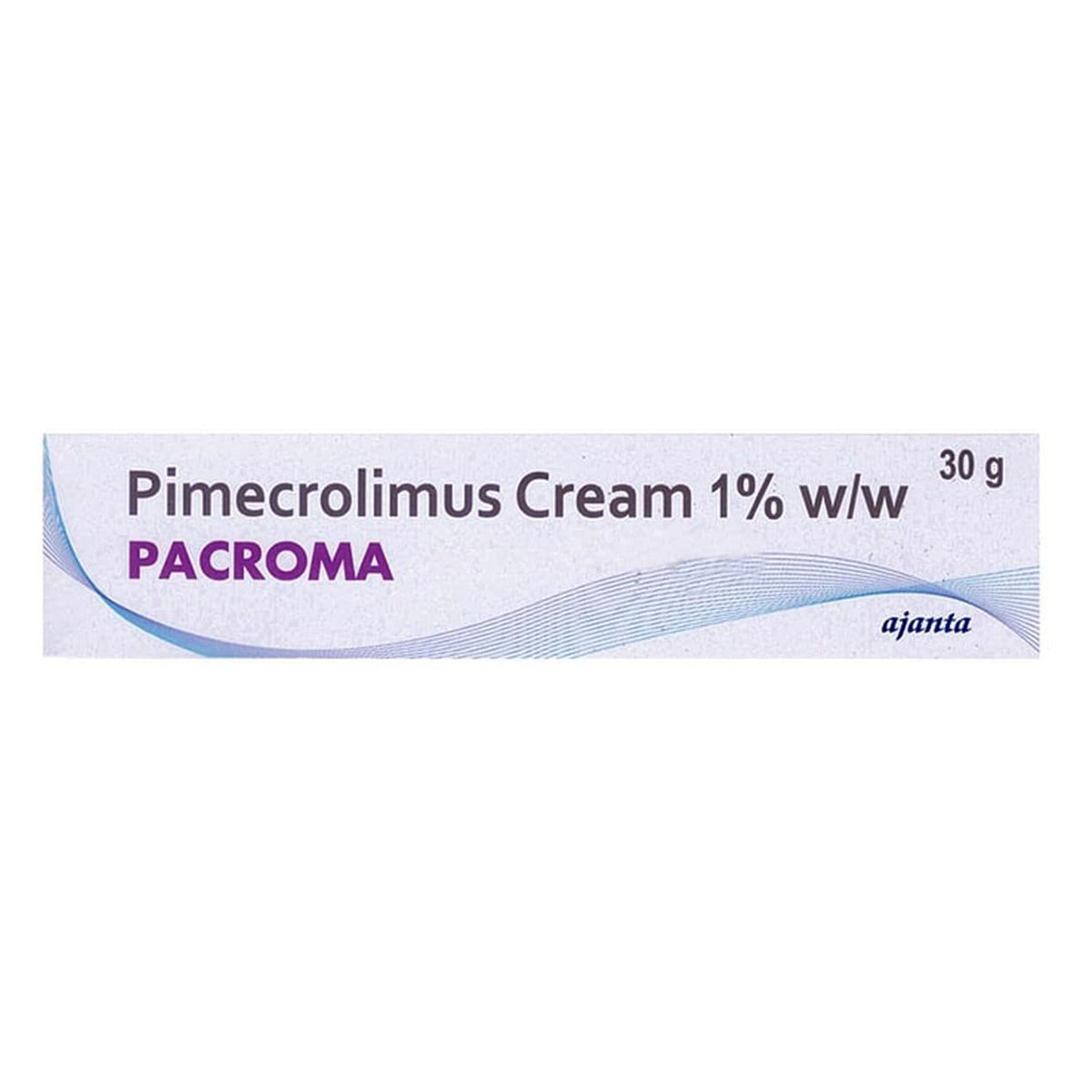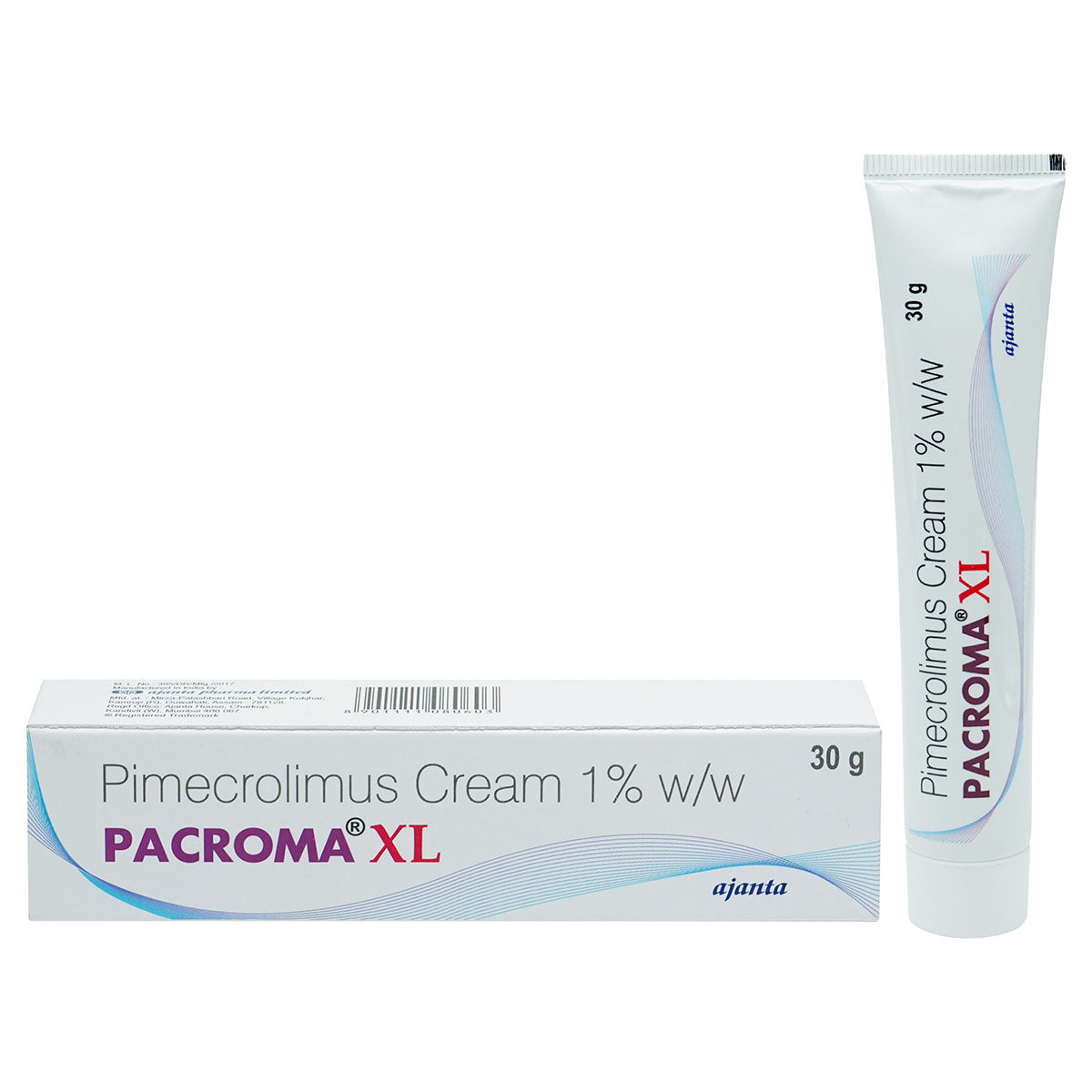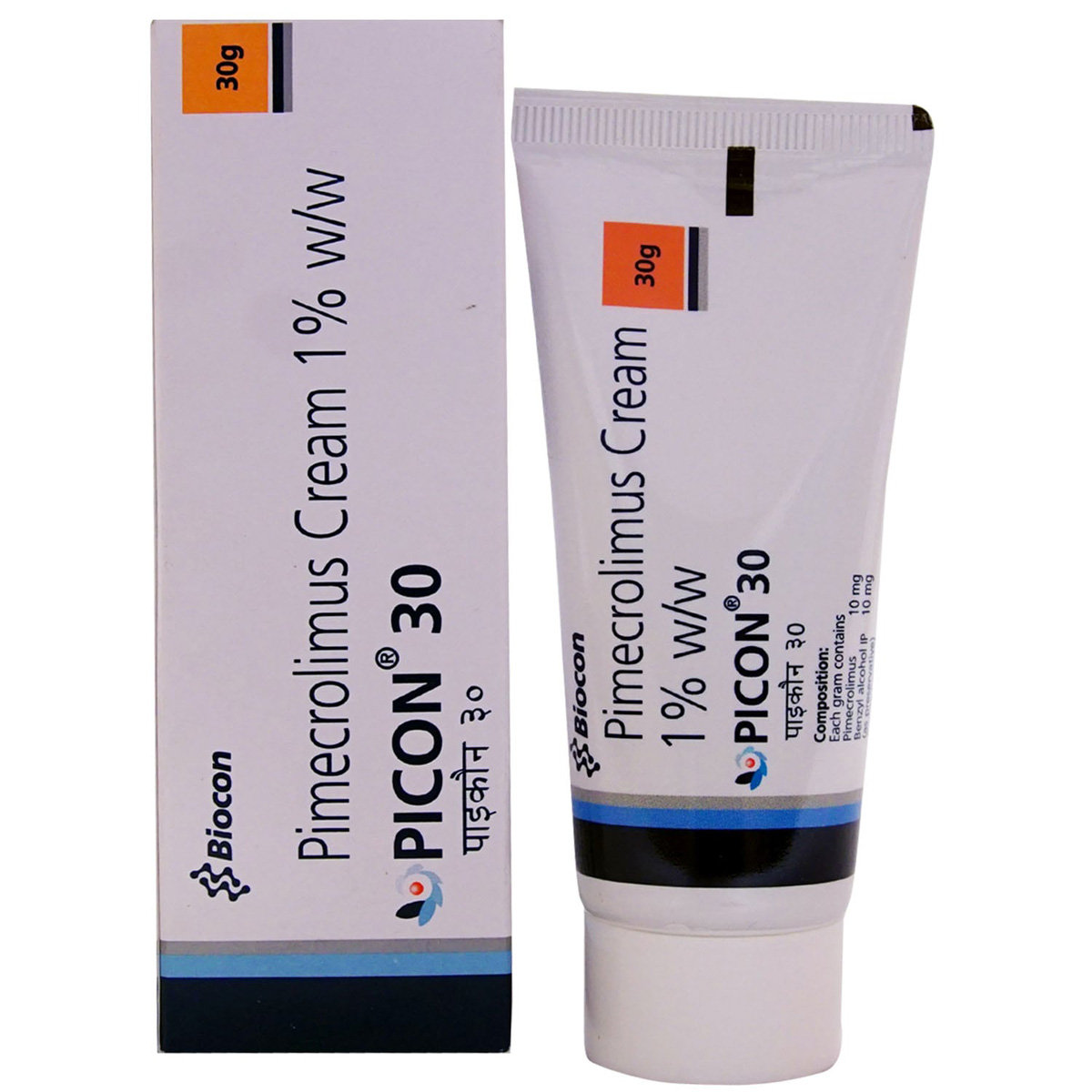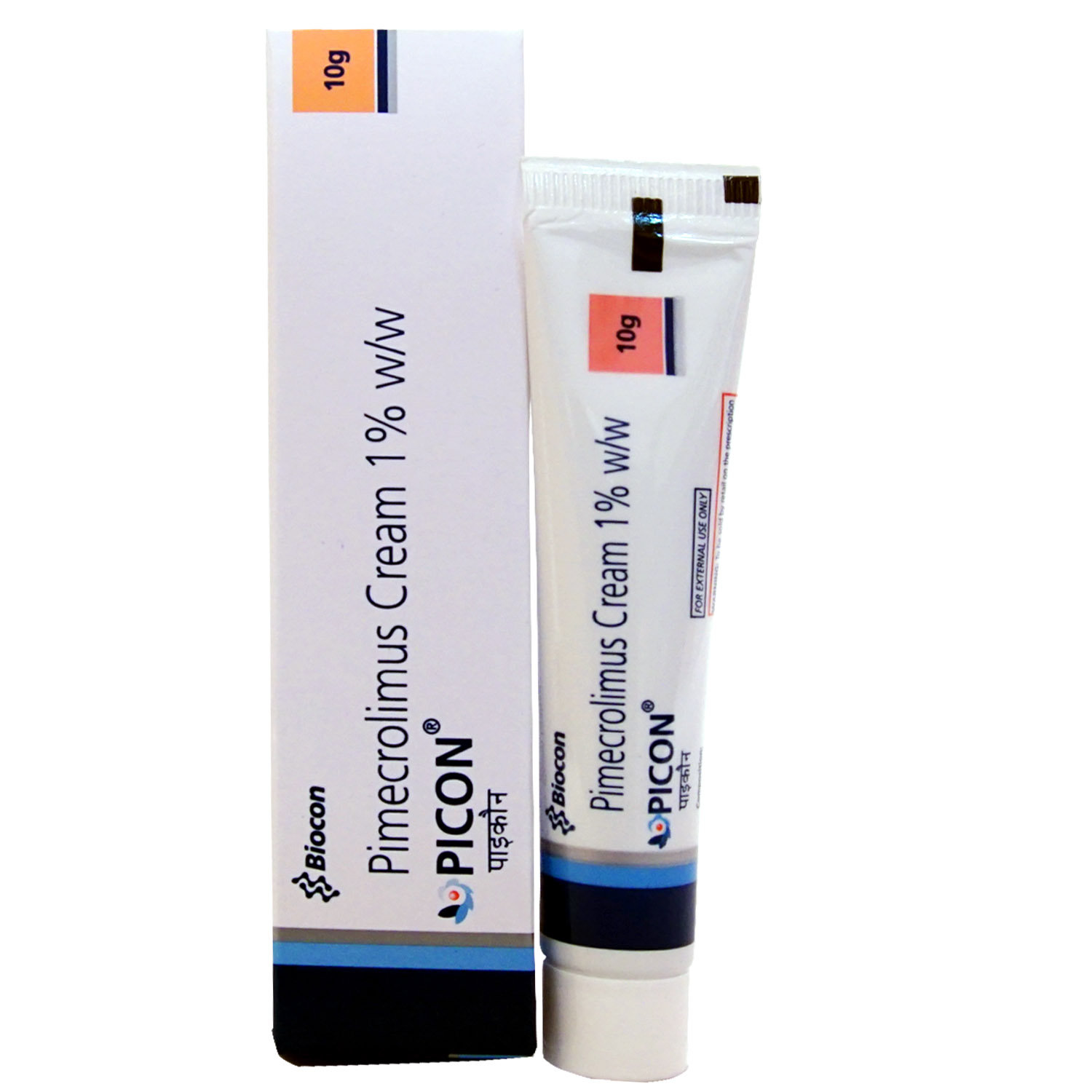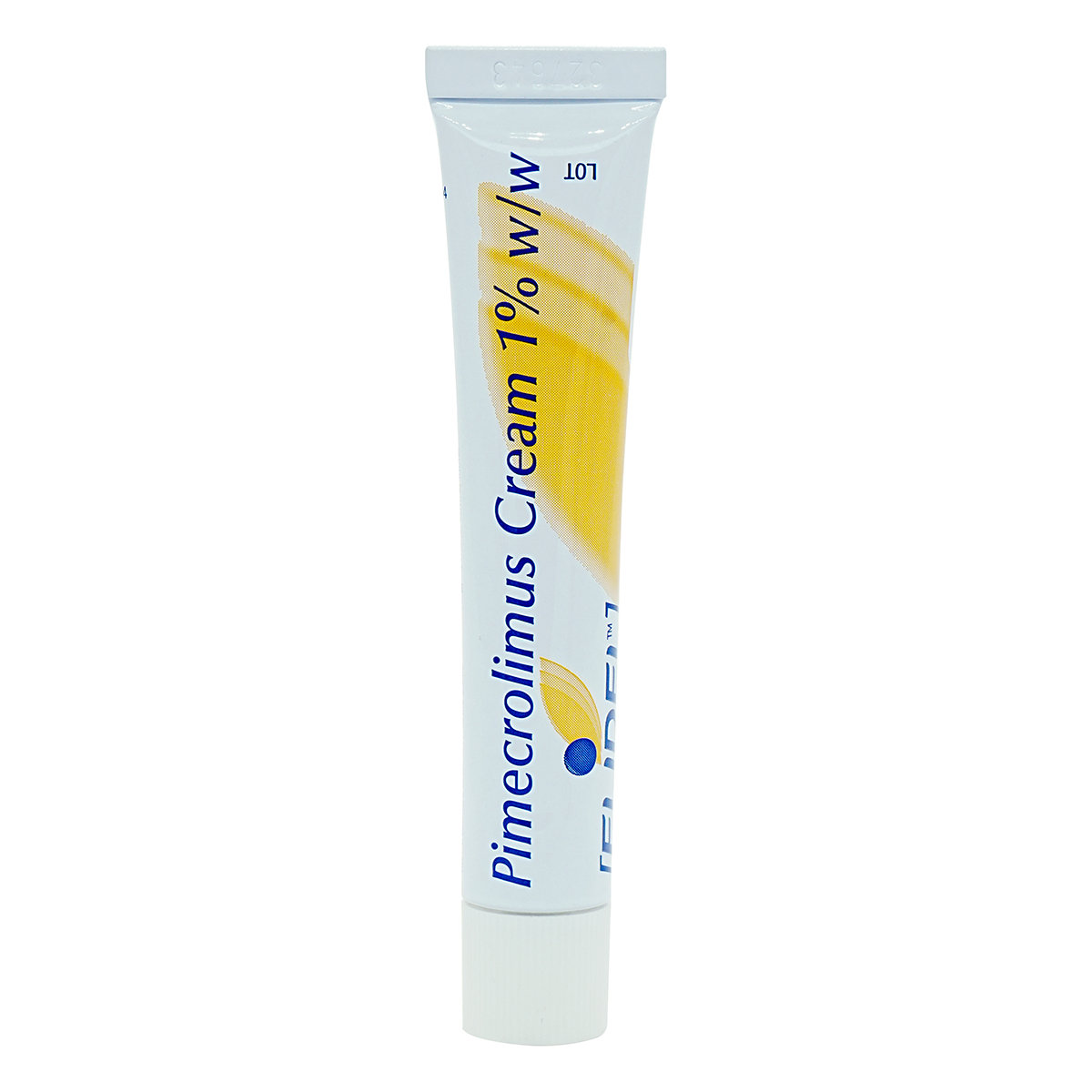Pimecrolimus
About Pimecrolimus
Pimecrolimus is used to prevent allergies, including swelling, itching, redness, heat, and pain caused by certain skin problems such as dermatitis (itchy, swelling of the skin) and eczema (itchy, cracked, swollen or rough skin).
Pimecrolimus contains Pimecrolimus, which works by stopping the immune system from producing chemical substances that may cause eczema. Thereby, it treats swelling, itching, redness, heat, and pain caused by skin problems such as eczema or atopic dermatitis.
Use Pimecrolimus as prescribed by your doctor. Common side effects of Pimecrolimus include burning, irritation, itching, and redness at the application site. If the side effects persist or worsen, please consult your doctor.
Avoid using Pimecrolimus if you are allergic to any of its components. If you are pregnant or a nursing mother, you are advised to consult your doctor before using Pimecrolimus. Do not use Pimecrolimus in more than prescribed doses or for a prolonged time, as it may cause adverse effects.
Uses of Pimecrolimus
Medicinal Benefits
- Pimecrolimus effectively treats atopic dermatitis (eczema) by reducing skin inflammation.
- It relieves itching, redness, swelling, heat, and discomfort associated with eczema.
- It helps heal itchy, cracked, rough, and swollen skin.
- It prevents worsening of symptoms when used at the early stages.
- Pimecrolimus reduces the frequency and severity of eczema flare-ups.
Directions for Use
- Follow your doctor’s recommendations on the dosage and timing of this medication to achieve optimal results.
- Take a small amount of Pimecrolimus on the fingertip and apply it as a thin layer on the clean and dry affected area as prescribed by your doctor.
- Avoid contact of Pimecrolimus with nose, mouth, or eyes. In case Pimecrolimus comes in contact with these areas accidentally, rinse with water thoroughly.
Storage
Side Effects of Pimecrolimus
- Mild irritation
- Skin redness
- Burning sensation at the site of application
Drug Warnings
- Do not use Pimecrolimus to areas of the skin affected by an active viral infection, such as cold sores (herpes simplex) or chickenpox.
- Pimecrolimus may be associated with an increased risk of severe herpes simplex skin infection (eczema herpeticum). Therefore, if you develop painful sores anywhere on your body, tell your doctor immediately.
- If you are pregnant or a nursing mother, it is advised to consult a doctor before using Pimecrolimus.
- Pimecrolimus is not recommended for children below 2 years of age.
- Avoid using Pimecrolimus on open wounds, windburned, sunburned, irritated, or dry skin.
- Do not cover or wrap the treated area with a bandage unless your doctor advises, as it may cause harmful effects.
- Avoid smoking or going near naked flames, as the fabric (bedding, clothing, dressings) that is in contact with Pimecrolimus catches fire and burns easily.
- If you have a weakened immune system (immunocompromised), have erythroderma (redness of almost the entire body), or a skin condition called Netherton’s syndrome (a disorder that affects the skin, hair and immune system), and skin malignancies (tumours), please inform your doctor before starting Pimecrolimus.
- Avoid excessive exposure to sunlight, sun lamps, and tanning beds while using Pimecrolimus. If you are outdoors after applying Pimecrolimus, wear loose-fitting clothing and appropriate sunscreen, and minimise the time you spend in the sun.
Drug Interactions
Drug-Drug Interaction: No interactions found.
Drug-Food Interaction: No interactions found.
Drug-Disease Interaction: No interactions found.
Drug-Drug Interactions Checker List:
Safety Advice

Alcohol
cautionDo not drink alcohol while using Pimecrolimus. It can make your skin (particularly on your face) become flushed or red and feel hot.

Pregnancy
cautionPimecrolimus is a Category C pregnancy drug. If you are pregnant, please consult your doctor before using Pimecrolimus. Your doctor prescribes this medicine if the benefits outweigh the risks.

Breast Feeding
cautionPimecrolimus is safe to use while nursing. Human studies indicate that the medication does not transfer into the breastmilk in large amounts and is not dangerous to the baby.

Driving
not applicablePimecrolimus usually does not affect your ability to drive or operate machinery.

Liver
consult your doctorIf you have a history of liver disease, please consult your doctor before using Pimecrolimus.

Kidney
consult your doctorIf you have a history of kidney disease, please consult your doctor before using Pimecrolimus.

Children
cautionPimecrolimus is not recommended for children below 2 years. However, for children above 2 years, Pimecrolimus should be used only as prescribed by a doctor.
Habit Forming
Diet & Lifestyle Advise
Dietary Recommendations:
- Eat foods rich in quercetin, such as apples, cherries, broccoli, spinach, and blueberries.
- Include fruits, vegetables, whole grains, healthy fats, and fish in your daily diet.
- Limit the intake of foods that may trigger allergies, such as dairy products, soy, eggs, and nuts.
- Avoid foods high in sugar, as they may worsen inflammation.
Lifestyle Modifications:
- Reducing stress and maintaining a regular sleep pattern can help manage symptoms effectively.
Skin Care Precautions:
- Avoid contact with harsh soaps, detergents, and rough fabrics to prevent skin irritation.
- Use mild soap while bathing and prefer warm baths over hot water.
- Avoid harsh skincare products that may aggravate sensitive skin.
- Do not scratch or pick the skin to prevent infection of the affected area.
Special Advise
- Avoid contact of Pimecrolimus with nose, mouth or eyes. In case Pimecrolimus comes in contact with these areas accidentally, rinse with water thoroughly.
Patients Concern
Disease/Condition Glossary
Atopic dermatitis (eczema): is a skin inflammatory condition characterised by red and itchy rashes. The most common cause of eczema is allergies. Contact with soaps, dyes, chemicals or other irritants may trigger rashes. Avoiding the triggers helps to prevent flare-ups of eczema. Dermatitis is a common skin condition associated with dry, itchy or swollen skin.
FAQs
Pimecrolimus is used to treat swelling, itching, and redness caused by certain skin problems such as dermatitis (itchy, swelling of the skin) and eczema (itchy, cracked, swollen or rough skin).
Pimecrolimus contains Pimecrolimus, which is an immunosuppressant. It works by suppressing your body's immune response. It treats an inflammation of the skin called atopic dermatitis (eczema).
You are recommended to use Pimecrolimus as long as your doctor has prescribed it. However, if the condition persists or worsens after 1 week of treatment with Pimecrolimus, please consult a doctor.
You are recommended to use Pimecrolimus on the face only if advised by your doctor and not use it for more than 5 days on the face as the skin on the face thins easily. Avoid the use of dressing or bandages on the face.
Pimecrolimus is for external use only. Avoid contact with the eyes. If Pimecrolimus gets into your eyes, nose, mouth or vagina, rinse with water. Do not put a bandage or a dressing on the affected area while using Pimecrolimus unless advised by the doctor. Do not apply Pimecrolimus on sunburns, open wounds, lesions and blisters. Do not contact anyone who has shingles, chickenpox, or measles. If you accidentally come in contact with any person having them, please inform your doctor immediately, as it requires special treatment if you have not had these illnesses.
The safety and efficacy of Pimecrolimus have shown no difference in young and elderly patients. So, Pimecrolimus can be given to treat skin infections in elderly patients.
You are recommended to cover the treated area of your skin with bandages or dressings only if advised by your doctor else it may increase the risk of side effects.
No, Pimecrolimus is not a steroid. It is an immunosuppressant.
Yes, Pimecrolimus is effective if used in the dose and duration as prescribed by your doctor. Do not stop using Pimecrolimus too early, even if you see improvement as it may cause recurring or worsening symptoms.
No, Pimecrolimus is not an over the counter medication. It is a prescription medicine which means it requires a valid prescription by a doctor in order to purchase it.
Take a small amount of Pimecrolimus on the fingertip and apply it as a thin layer on the clean and dry affected area as prescribed by your doctor. Rub in gently. Avoid contact of Pimecrolimus with nose, mouth or eyes. In case of accidental contact with these areas, rinse with water thoroughly. Wash your hands before and after using Pimecrolimus if your hands are not the affected area.
If you forget to use Pimecrolimus, apply it as soon as you remember. But, if it is time for your next application, skip the missed dose and continue your regular dose. Do not apply extra cream to make up for a missed dose.


